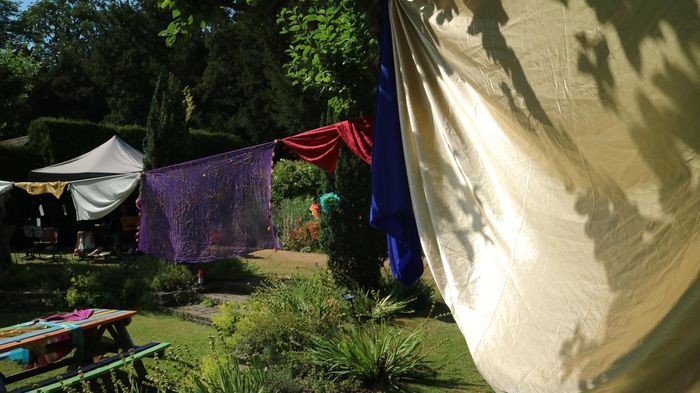Lend me your ears… and your accents
Sophie Ennis reflects on the importance of regional accents when performing Shakespeare

There was much to love about Nicholas Hytner’s production of A Midsummer Night’s Dream at London’s Bridge Theatre – fabulous costumes, a playfully inventive set, and a cleverly engineered gender flip that had the audience doubled over in laughter all evening. But among these, there was one thing that stood out to me: Puck’s Mancunian accent.
My ears immediately pricked up the first time he spoke; after two years in Cambridge, hearing a northern accent in a room full of southerners sets off a Pavlovian response in me. Typically, especially when watching a comedy, this pleasant surprise tends to quickly fade into eye-rolling realisation. Regional accents are too often used as cheap humour which can undercut an otherwise intelligent and genuinely funny script. I’ve sat in plenty of audiences where people are in stitches over a character whose only ‘funny’ quality is whatever comedy generic accent they’ve been asked to put on. However, in this production of A Midsummer Night’s Dream, Puck’s voice felt just right: the accent did not define the character. Puck was delightfully multi-dimensional – mischievous, brazen, chaotic, sexy, sinister, bizarre – and his voice only helped to enrich this complexity.
“Regional accents are too often used as cheap humour which can undercut an otherwise intelligent and genuinely funny script”
Unfortunately, these Complex Northern Characters are a rare breed on the Shakespearean stage. Theatre has a habit of only staging characters with regional accents as lazy stereotypes. Take, for example, the production of Othello I once saw, in which a Cockney Desdemona was the daughter of a gang leader and died, disappointingly, on top of a pool table in the middle of a pub. From Yorkshire nurses and Scottish villains to Geordie clowns and West Country servants, the caricatures are endless. Meanwhile, countless leading roles are taken up by actors speaking in RP. A Midsummer Night’s Dream is, of course, a comedy, and despite me being pleasantly surprised by the accent diversity in the production I saw, it’s unsurprising that it was this play in particular. It goes without saying that comedy is so much more than just a testing ground for new ideas, but when your audience is expecting something ridiculous, when they know it’s okay to laugh, it does become easier to push boundaries and do what’s unexpected. I think a lot of more ‘serious’ theatre is reluctant to push the envelope in the same way, afraid of making audiences feel awkward or of being frowned upon for not upholding certain traditions.
Besides, for all you Shakespeare purists out there, a stage full of actors with regional accents would actually be pretty close to the real thing: the way people spoke back in Shakespeare’s day wouldn’t have sounded remotely close to what we’re used to hearing on stage now. Original Pronunciation (OP), the Early Modern English dialect Shakespeare would have spoken in, contains bits of pretty much every regional UK accent, as well as American and Australian. Around two-thirds of Shakespeare’s sonnets contain rhymes that only work in OP – so, contrary to popular belief, his work isn’t really built for being read in a ‘posh’ accent.
“So, contrary to popular belief, his work isn’t really built for being read in a ‘posh’ accent”
In spite of this, with the exception of Macbeth, it’s rare, if not unheard of, to see a Shakespearean lead played by an actor with a regional accent. You might giggle at the thought of a Geordie Juliet or a Cockney Cleopatra, but only because we’ve been conditioned into not taking these accents seriously. This is, of course, part of a much broader socio-economic-linguistic issue. Strong accents are typically associated with the working class, and it’s no coincidence that they appear less in creative spaces than more ‘standard’ accents. As the saying goes, life imitates art, but if art only continues to perpetuate these negative stereotypes then where does that leave working class creatives – the very small percentage who do manage to break into the arts – who just want to be taken seriously?
At the end of A Midsummer Night’s Dream, I brought all this up to my friend who I’d gone to see it with. “I’m going to put on a Scouse Hamlet,” I joked. But why should that be so radical? Hamlet was Danish for God’s sake – there’s hardly a ‘right’ accent for doing Shakespeare in. Regional accents shouldn’t just be restricted to regional contexts, and giving leading roles to these voices opens a door to something which for many people might otherwise seem inaccessible. When a familiar voice enters the spotlight, it allows you to see yourself in their world – behind the curtain or under the lights, as a lover lost in a magical forest or a monarch ruling over their kingdom. Admittedly, Hamlet’s madness and vengeful murder might not be the best way to challenge stereotypes, but it’s a step in the right direction for now.
 News / Right-wing billionaire Peter Thiel gives ‘antichrist’ lecture in Cambridge6 February 2026
News / Right-wing billionaire Peter Thiel gives ‘antichrist’ lecture in Cambridge6 February 2026 Features / From fresher to finalist: how have you evolved at Cambridge?10 February 2026
Features / From fresher to finalist: how have you evolved at Cambridge?10 February 2026 Film & TV / Remembering Rob Reiner 11 February 2026
Film & TV / Remembering Rob Reiner 11 February 2026 News / Churchill plans for new Archives Centre building10 February 2026
News / Churchill plans for new Archives Centre building10 February 2026 News / Epstein contacted Cambridge academics about research funding6 February 2026
News / Epstein contacted Cambridge academics about research funding6 February 2026










